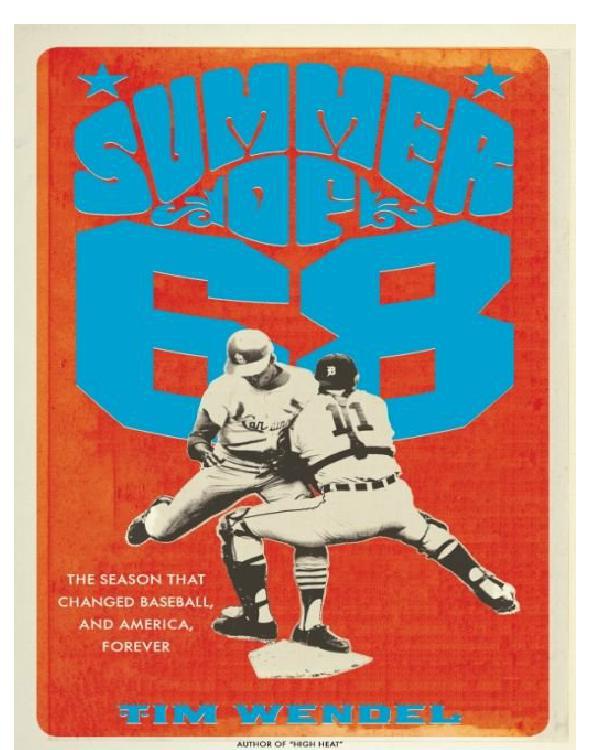
Summer of '68
The Season That Changed Baseball—and America—Forever
کتاب های مرتبط
- اطلاعات
- نقد و بررسی
- دیدگاه کاربران
نقد و بررسی

February 20, 2012
Sportswriter Wendel (High Heat: The Secret History of the Fastball) mines one of baseball’s more absorbing episodes in this rich chronicle of the 1968 season. It’s a sociologically resonant account, anchored by the Detroit Tigers’ pennant campaign, which helped settle the city after the 1967 race riots, and overshadowed by football’s impending eclipse of the national pastime. Wendel sometimes overswings for historical context as he revisits political traumas, from the assassination of Martin Luther King Jr. to the Chicago Democratic Convention, and roams afield to the Mexico City Olympics and other sports events. He’s at his best just sitting in the ballpark, savoring the Year of the Pitcher’s classic mound performances: a Catfish Hunter perfect game; scads of no-hitters and shutouts; the legendary seasons posted by the Tigers’ 31-game winner Denny McClain and Cardinals ace Bob Gibson—who had an unheard-of 1.12 ERA—before their World Series showdown. Wendel provides telling color commentary—the contrast between the obsessive, steely-eyed Gibson and McClain, a flamboyant press-hound angling for a Vegas nightclub gig, is especially vivid—and sharp analyses of on-field strategizing and play-by-play. If not as significant as the author imagines, the story still packs plenty of meaning. Photos. Agent: Chris Park, Foundry Media.

February 15, 2012
During one of the most tumultuous years in our history, a remarkable baseball season unfolded. In 1968, most baseball players had to work a second job to make ends meet. There were no wild-card teams or division winners. That year the Detroit Tigers became only the third club in history to rally from a 3-1 deficit to defeat the powerful St. Louis Cardinals in the Fall Classic. Showcasing this looming match-up, Wendel (Writing/Johns Hopkins Univ.; High Heat: The Secret History of the Fastball and the Improbable Search for the Fastest Pitcher of All Time, 2010, etc.) foreshortens the season by focusing on the stories of individual Tigers Gates Brown, Willie Horton, Dick McAuliffe and, especially, pitchers Denny McLain, who won an astonishing 31 games, and Mickey Lolich, the Series MVP. The author also looks at Cardinal stars Lou Brock, Curt Flood, Tim McCarver, Orlando Cepeda and especially pitcher Bob Gibson, among the game's all-time greatest. He charts the thrilling Series game by game. More intriguing, though, is the season's unique backdrop: the "Year of the Pitcher" in baseball and the national turmoil surrounding the sports world. In addition to McLain and Gibson's heroics (both won the Cy Young and MVP awards), the season saw five no-hitters (including a perfect game by Catfish Hunter), a consecutive game strikeout record by Luis Tiant and an unprecedented scoreless innings streak by Don Drysdale. Meanwhile, the country was falling apart. Urban riots and massive antiwar demonstrations helped persuade LBJ not to run again. By the time the Chicago Democratic Convention exploded in the streets, Martin Luther King Jr. and Robert Kennedy had already been assassinated. Wendel touches briefly on how the year agitated other sports, but he focuses on the baseball story and the athletes accustomed to ignoring the outside world. They found that impossible to do in the chaotic year of '68. An appealing mix of baseball and cultural history.
COPYRIGHT(2012) Kirkus Reviews, ALL RIGHTS RESERVED.

February 1, 2012
Wendel (fiction & nonfiction writing, Johns Hopkins Univ.; High Heat: The Secret History of the Fastball and the Improbable Search for the Fastest Pitcher of All Time) follows the tradition of homing in on a key year in both baseball and U.S. history. America was being torn apart in 1968, and baseball was under stress, too. The pennant-winning St. Louis Cardinals and Detroit Tigers had players at loggerheads with one another. Star players like Cardinal ace Bob Gibson were not immune to racial tension and prejudice. And yet, the ultimate story is one of triumph as these teams provided some respite and hope to a beleaguered country suffering from the effects of the Vietnam War and the assassinations of Martin Luther King Jr. and Robert F. Kennedy. Wendel has interviewed many of the key participants to bring this crucial year to life. Transcending baseball history alone, this is recommended for baseball fans and students of the era.--P.K.
Copyright 2012 Library Journal, LLC Used with permission.

April 15, 2012
Wendel might be overreaching to find causal relationships between politics and baseball in the sea changes that took place for both during 1968a year of tumult, from the assassinations of Martin Luther King Jr. and Robert F. Kennedy to the riotous Democratic convention that August in Chicago, from baseball's last World Series before the onset of the playoff system to the imperceptible passing of the torch from baseball to football as the U.S. national pastime. Still, Wendel details a terrific World Series between the St. Louis Cardinals and Detroit Tigers, set against a Rust Belt (especially Detroit) self-immolating in race rioting and job flight. And he brings into relief the players, influenced by the political climate or not, who had a profound impact on the game: Bob Gibson, whose 1.12 ERA would result in changes that would tip the game to the hitters; Denny McLain, baseball's last 30-game winner; Curt Flood, whose refusal to accept a trade in 1969 would open up free agency for his fellow players; and Mickey Lolich, an Everyman whose steady pitching led to the title for his resilient, even heroic Tigers.(Reprinted with permission of Booklist, copyright 2012, American Library Association.)

























دیدگاه کاربران